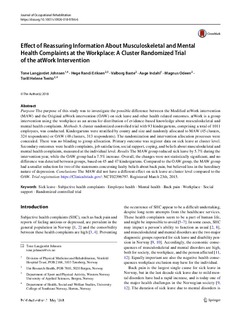Effect of Reassuring Information About Musculoskeletal and Mental Health Complaints at the Workplace: A Cluster Randomized Trial of the atWork Intervention
Johnsen, Tone Langjordet; Eriksen, Hege Randi; Baste, Valborg; Indahl, Aage; Odéen, Magnus; Tveito, Torill Helene
Journal article, Peer reviewed
Published version
Permanent lenke
http://hdl.handle.net/11250/2586009Utgivelsesdato
2018Metadata
Vis full innførselSamlinger
Originalversjon
Johnsen, T. L., Eriksen, H. R., Baste, V., Indahl, A., Odeen, M., & Tveito, T. H. (2018). Effect of reassuring information about musculoskeletal and mental health complaints at the workplace: A cluster randomized trial of the atWork intervention. Journal of Occupational Rehabilitation, 2018. 10.1007/s10926-018-9786-6Sammendrag
Purpose The purpose of this study was to investigate the possible difference between the Modified atWork intervention (MAW) and the Original atWork intervention (OAW) on sick leave and other health related outcomes. atWork is a group intervention using the workplace as an arena for distribution of evidence-based knowledge about musculoskeletal and mental health complaints. Methods A cluster randomized controlled trial with 93 kindergartens, comprising a total of 1011 employees, was conducted. Kindergartens were stratified by county and size and randomly allocated to MAW (45 clusters, 324 respondents) or OAW (48 clusters, 313 respondents). The randomization and intervention allocation processes were concealed. There was no blinding to group allocation. Primary outcome was register data on sick leave at cluster level. Secondary outcomes were health complaints, job satisfaction, social support, coping, and beliefs about musculoskeletal and mental health complaints, measured at the individual level. Results The MAW group reduced sick leave by 5.7% during the intervention year, while the OAW group had a 7.5% increase. Overall, the changes were not statistically significant, and no difference was detected between groups, based on 45 and 47 kindergartens. Compared to the OAW group, the MAW group had a smaller reduction for two of the statements concerning faulty beliefs about back pain, but believed less in the hereditary nature of depression. Conclusions The MAW did not have a different effect on sick leave at cluster level compared to the OAW.

